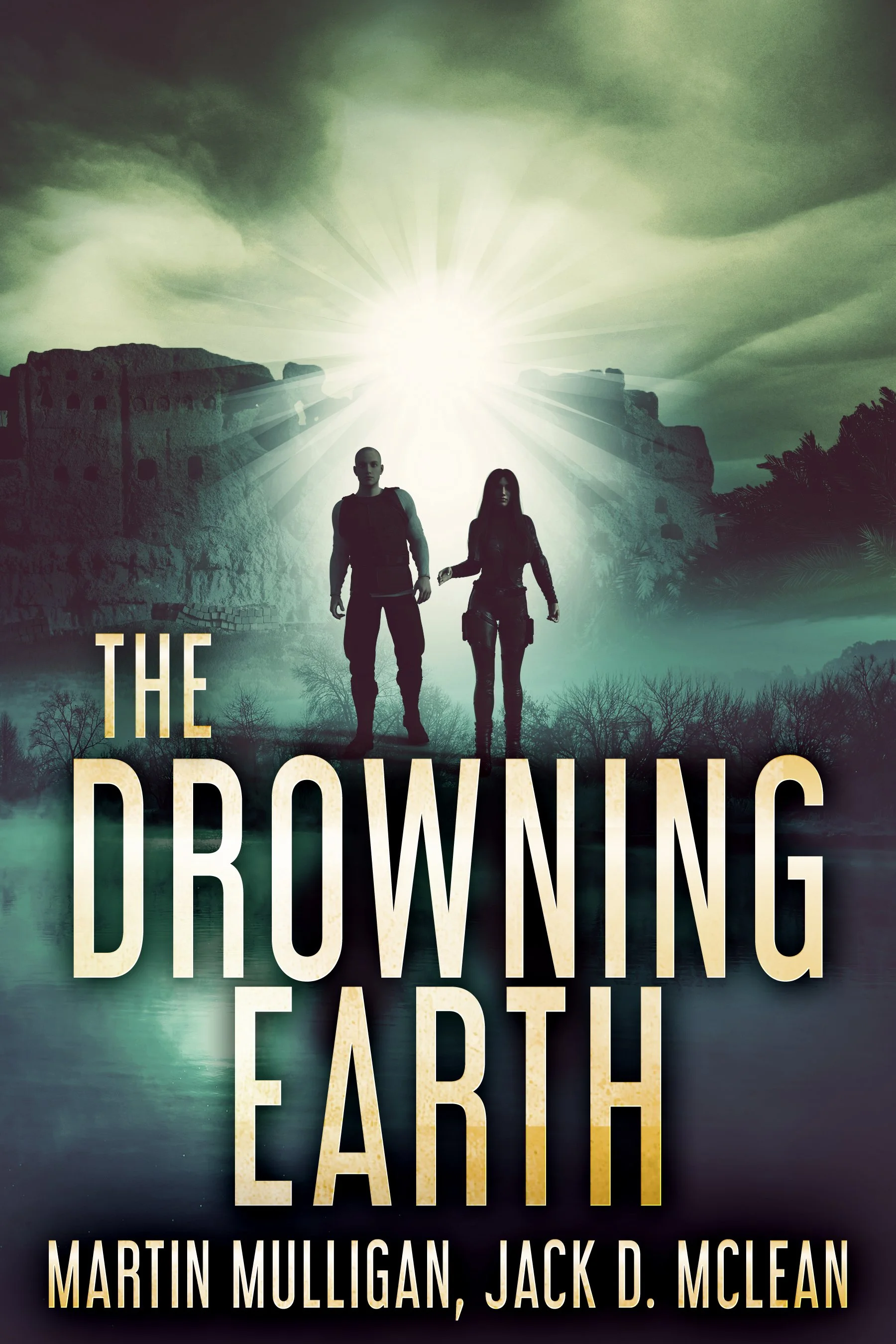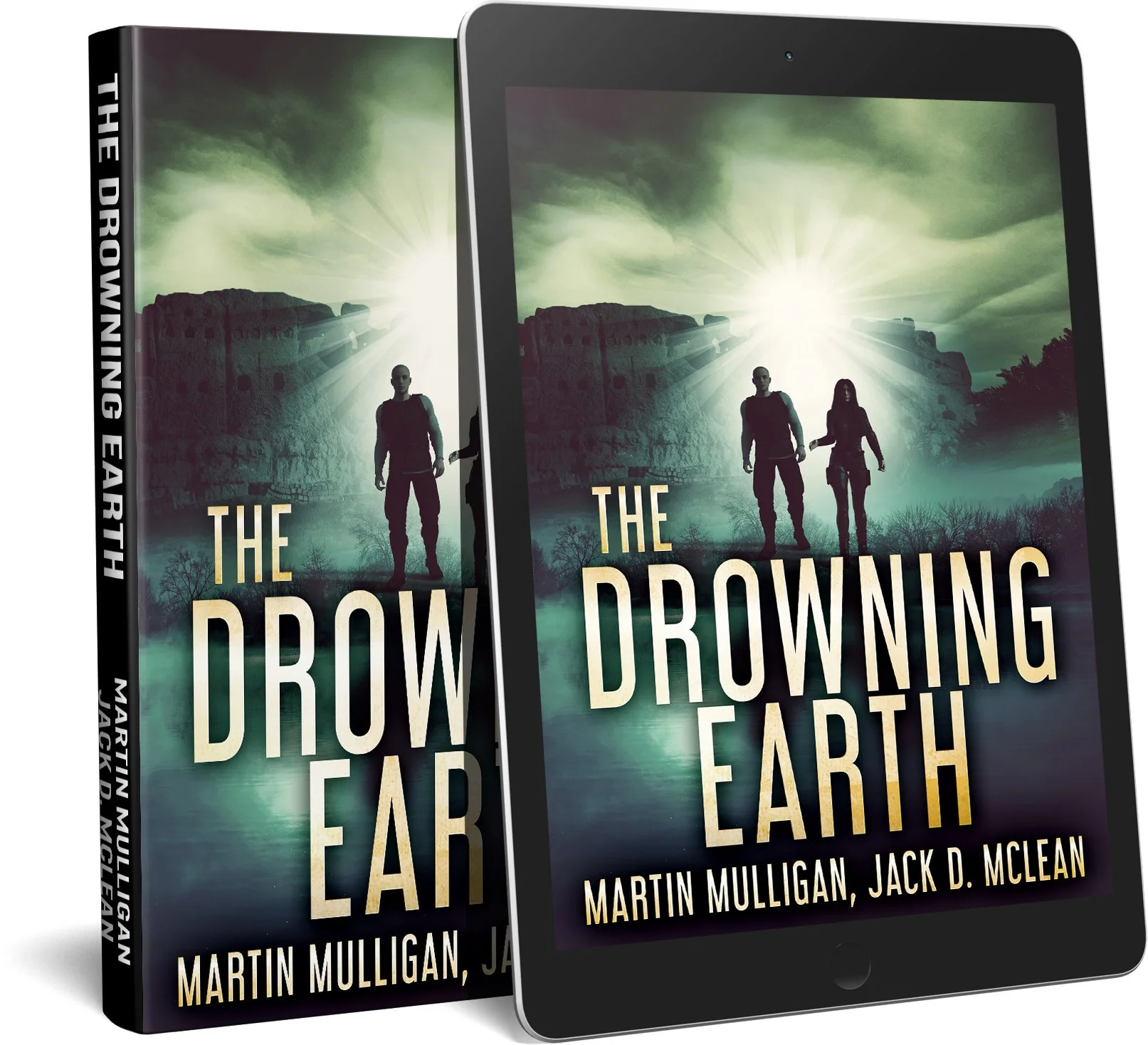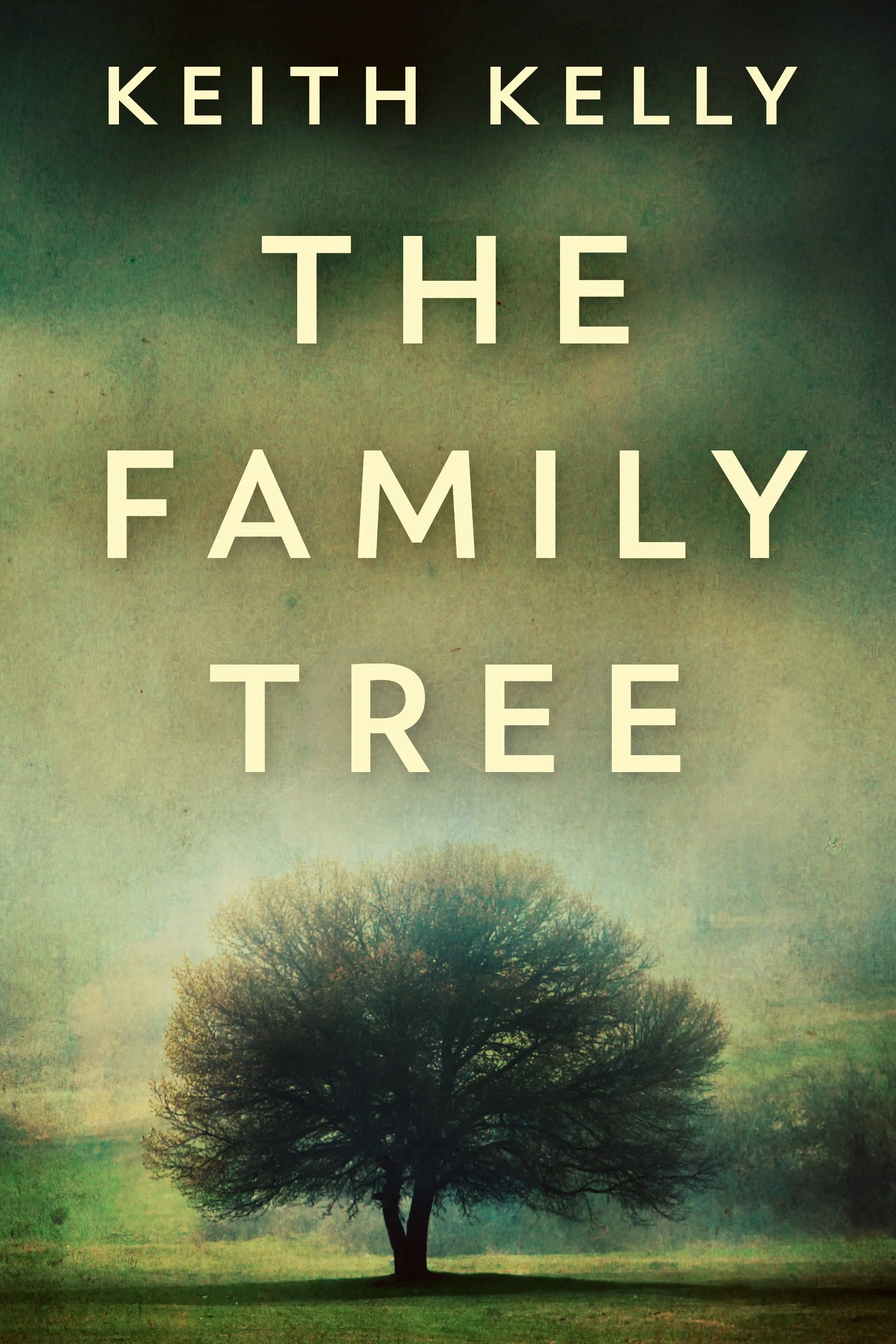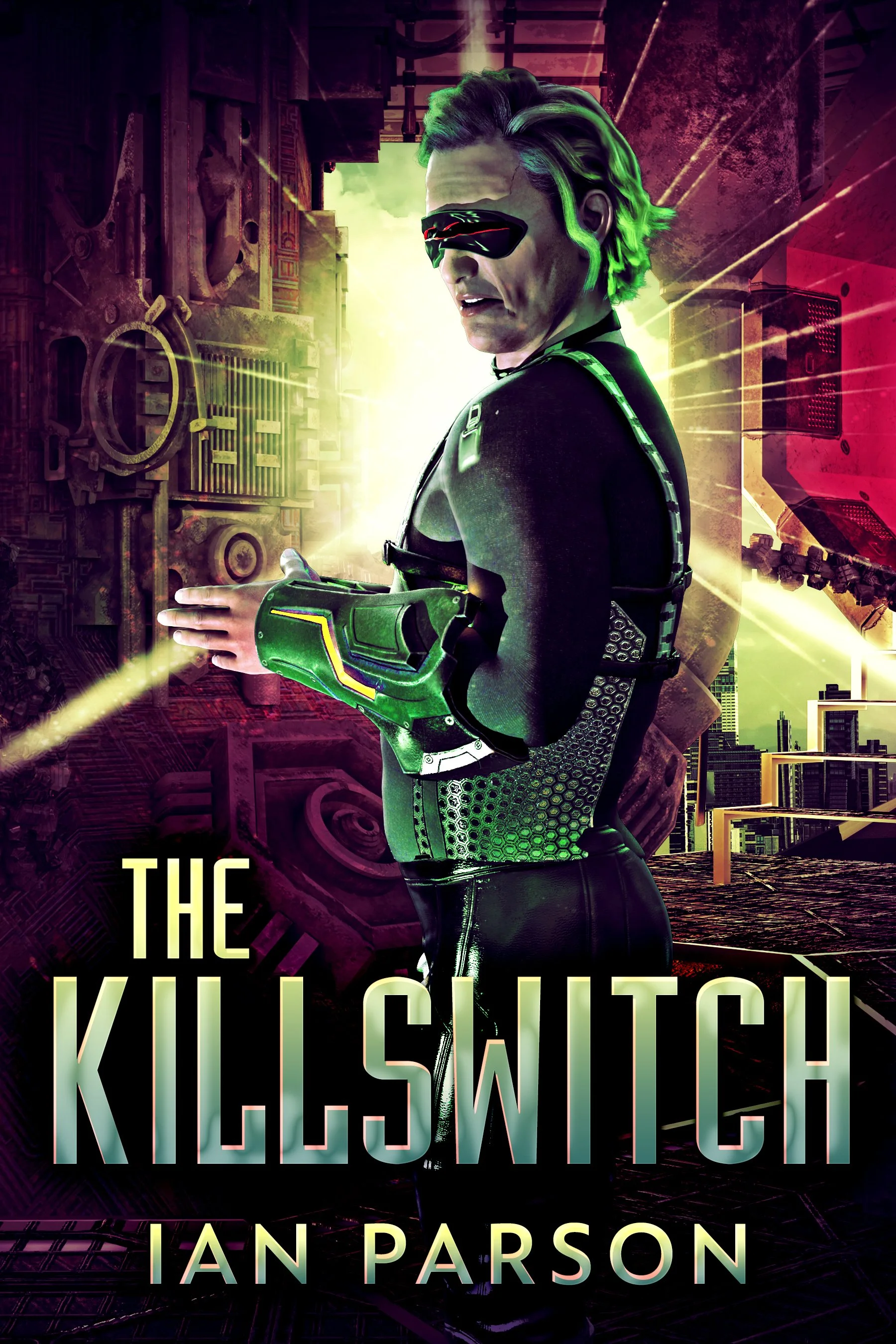The Drowning Earth - Martin Mulligan, and Jack D. McLean
The Drowning Earth by Martin Mulligan, and Jack D. McLean
Book excerpt
I was taking a dead bullock off the roof when the bell tolled to signal someone was in the vicinity of the perimeter gate. Donnie was barking and yanking his chain below me in the yard so I craned my neck and squinted over the steel stake palisade and the DUKW cage. Bob the Jinx’s canoe was approaching my makeshift wharf.
The bullock’s throat must have been cut by a piece of corrugated metal. The regular storms we had now were nothing like that first one, but they were still strong enough to pick up a cow. Also to rip up tin fences and whirl the rusty corrugated stuff around like razor blades. The gust that had thrown the black bullock onto my roof would have killed it anyway on impact but as it was the beast’s head was nearly severed into the bargain.
It took some manoeuvring and grunting up there before I was able to shuck the carcass down off the roof of the Keep and let it fall into the yard. It landed with a liquid whomp! about a body length from the reinforced doors. A small rain of blood – the little that was left in that torn throat – spattered the sills.
Then I started down the heavy steel ladder to clean up and to find out why Bob had risked the journey through the Badlands from Woodstock. What could he have on his mind that was so critical? He’d paddled his canoe five straight miles across flooded territory occupied by the worst of what society, or what was left of it, had to offer. He might have met any number of threats on the way including the packs of giant mink that had taken over one of the evolutionary niches that were Storm side effects. I don’t know when I’d first noticed the mink and some of the other wildlife getting bigger due to the changed conditions. Maybe ten years before. The speed of the change had taken me by surprise. I saw a coypu nearly as large as a pony when I’d last driven the DUKW down to the river on a recce. It was swimming upstream and looked strong enough to do so all day. No mere survivor but a flourishing invader, its gingery furred head held high as it went against the current, it seemed to be saying: ‘We coypu rule the world now.’
I watched as Bob tethered up his canoe then I let down the drawbridge and showed him into the room I referred to as my inner sanctum. He had James with him, as I knew he would.
Greeting James with a careful hug I felt a stiffness in his slender body that wasn’t usually there. When I hugged Bob his frame felt similarly tense.
Bob stepped back from my embrace and with a wave of my arm I indicated the Chesterfield I reserved for guests, not that I ever had any. Bob took the hint and folded his tall frame into it while James stood unmoving, smiled, and looked at the carpet, shifting his weight from foot to foot. It was best to let him alone when he was like this. He’d find a place to sit or stand in his own time.
I settled in an armchair opposite the sofa and took the opportunity to study Bob’s face. He was pale, his cheeks sunken, and he had a tic playing beneath his left eye. Bob only ever got that tic when something was seriously wrong. I decided against asking him what it was. He’d tell me if he wanted to.
‘Whisky, Bob?’
‘Johnnie Walker Double Black if you’ve got any left, Zack.’
There was a stash in my drinks cabinet that I’d liberated from the Randolph Hotel along with some fine crystal glasses while mobs were plundering everything they could get their hands on just before the floods hit. I regret to admit I was among them. Desperate times, as they say.
‘As it happens, I have.’
Opening a new bottle I poured us each a generous measure in two of the crystal glasses and handed one to Bob. There was a bottle of my homemade ginger beer there that I lifted to catch James’s eye and he saw me but was still rapt by the design in the carpet, a Turkish flat-weave kilim with a blue scorpion motif. I let him be.
In days gone by, Bob would’ve appreciated the artistry of the crystal ware. But not today. It was another sign something serious was playing on his mind. He took a gulp of the Johnny Walker then quickly took another, completely draining his glass. I drew my own conclusions and topped him up brim-full.
‘Thanks, Zack. How are things?’
I took a sip myself. I’ve long been a fan of whisky in general and Johnny Walker Double Black in particular. I used to drink it simply for pleasure. Since the floods hit, I’d started drinking it to escape the reality we all faced. I knew I’d have to watch that. It was on the verge of becoming a bad habit, one that could get me killed.
‘Apart from a bullock on the roof and the giant mink that’ll eat anything that moves around here, including me if I don’t watch my step, everything’s hunky-dory. How are things with you, Bob?’
He gave me a brittle smile.
‘Bearing up.’ Then, swirling his whisky and looking into the glass as if into a bottomless well, he added: ‘I don’t know where to start.’
That was my cue to jump in with words of encouragement.
‘Start slowly and at the beginning. What’s this about?’
Bob closed his eyes so tight a network of lines erupted around them. Putting down his glass he rubbed his eyelids with his hands loosely clenched. For a moment I thought he might burst into tears, and indeed when he opened his eyes again they had a tell-tale sheen. But he didn’t go so far as to cry, he held it in. The effort cost him. He picked up his glass and took yet another glug from it.
‘Tom’s gone, disappeared off the face of the Earth like he never existed,’ he said, his hand trembling so much I wondered if he was going to spill the remaining contents.
I found myself standing, drink in hand with the ice clinking. James started like a horse and jumped back from the rug he’d been studying so intently.
‘Sorry, James,’ I said, kicking myself inwardly before walking in a very controlled way over to the drinks cabinet again and filling up a glass with ginger beer. When I got back to James, deliberately calm and slow in my gait, he took the soft drink from my hand with a brief smile, like a light going on and off. Then he walked over to the window and got that fixed look again, gazing out. He could see a corner of Donnie’s pen from this angle. Donnie fascinated him.
‘Tom took my dinghy out onto the Marsh three days ago,’ Bob said when he was able to speak. ‘We’ve looked everywhere. James (he inclined his head to indicate his son by the window) – he’s beside himself (in a whisper). We searched every reed-bed and tethering area and stand of trees, every damn place Tom might have stopped or camped dawn till dusk for two days straight. We didn’t find a trace of him anywhere.’ Bob had tears in his eyes. His lower lip and chin were trembling. ‘Zack, I don’t know what to do. Can we all take your gunship (he meant the DUKW) to look for Tom? God only knows what’s happened to him. Those Kwanon bastards maybe took him… the solstice is near, we all know what that means… if he’s…’
He couldn’t finish the sentence and put a hand over his eyes, gulping to get his voice under control. I sat down slowly opposite Bob and finished my whisky in two well-spaced mouthfuls before replying.
‘OK, Bob, I see. This is bad but we can’t assume the worst. Let’s stay calm and think for a moment. Is there anything else you know about where Tom might have gone?’
James was still at the window. His shoulders stiffened as I spoke. I looked over at him and he turned quickly away, redoubling his efforts to catch a glimpse of Donnie down below. Bob said:
‘There is something. He told me he’d seen a girl in the Folan Territory when he was out trapping crayfish and they’d shared a joint together. I told him he must have been insane. He got defensive like teenagers do, told me to mind my own business and said that not all the people out there were mad and bad. I kept at him about it until he said he wouldn’t do anything like it again, not that I was naïve enough to believe him.’
















Praesent id libero id metus varius consectetur ac eget diam. Nulla felis nunc, consequat laoreet lacus id.